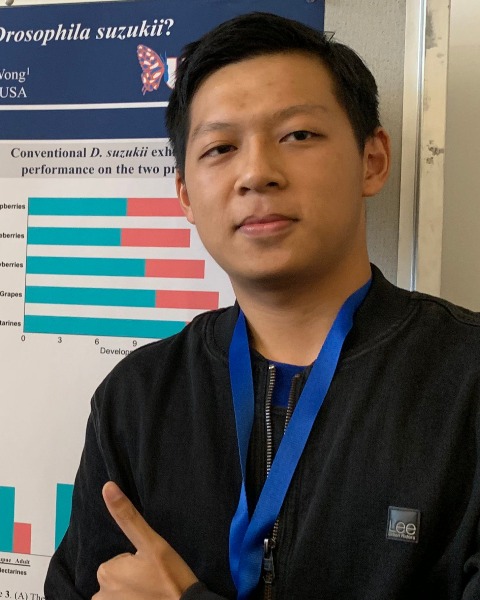P-IE
Section Symposium
Drosophila Interactions for All — From Endosymbionts to Ecosystems
3: The impact of commensal bacteria on Drosophila suzukii foraging behavior
On-Demand

Runhang Shu
Univerisity of Florida
Gainesville, Florida- AW
Adam Adam Wong (he/him/his)
University of Florida
Gainesville, Florida - JB
John J. Beck
USDA-ARS
Gainesville, Florida
Presenting Author(s)
Co-Author(s)
Food-seeking and selection are crucial for the survival, growth, and reproduction of animals. In the fly model Drosophila melanogaster, recent studies have demonstrated that symbiotic gut bacteria can influence host foraging behavior, such as by priming the host olfactory-guided preference toward specific bacteria on food and regulating host appetite toward specific dietary macronutrients. However, the majority of studies have been conducted using semi- or fully defined artificial diet choices. The influence of the commensals on host foraging toward more natural food sources remains unexplored.
In this study, we selected five fruits (blueberries, raspberries, strawberries, grapes, and nectarines) that are considered D. suzukii’s natural hosts for the foraging assay to quantify the effects of the gut microbiome on flies’ overall food-seeking and fruit preference. The results show food-deprived axenic females had a lower food-seeking drive than conventional females, despite the axenic flies were more susceptible to death by starvation, and starvation-induced hyperactivity was more pronounced in axenic than conventional females. The fruit preferences of flies were unaffected by the microbiome, in which both sexes showed the strongest preference towards raspberries among five fruits during foraging. Both conventional and axenic females laid the highest proportions of eggs on raspberries and on other fruits at comparable proportions. However, total egg production was substantially reduced in axenic females as compared to conventional females. Together, our results suggest that oviposition may dominate feeding during the food-seeking process of female D. suzukii.
In this study, we selected five fruits (blueberries, raspberries, strawberries, grapes, and nectarines) that are considered D. suzukii’s natural hosts for the foraging assay to quantify the effects of the gut microbiome on flies’ overall food-seeking and fruit preference. The results show food-deprived axenic females had a lower food-seeking drive than conventional females, despite the axenic flies were more susceptible to death by starvation, and starvation-induced hyperactivity was more pronounced in axenic than conventional females. The fruit preferences of flies were unaffected by the microbiome, in which both sexes showed the strongest preference towards raspberries among five fruits during foraging. Both conventional and axenic females laid the highest proportions of eggs on raspberries and on other fruits at comparable proportions. However, total egg production was substantially reduced in axenic females as compared to conventional females. Together, our results suggest that oviposition may dominate feeding during the food-seeking process of female D. suzukii.

